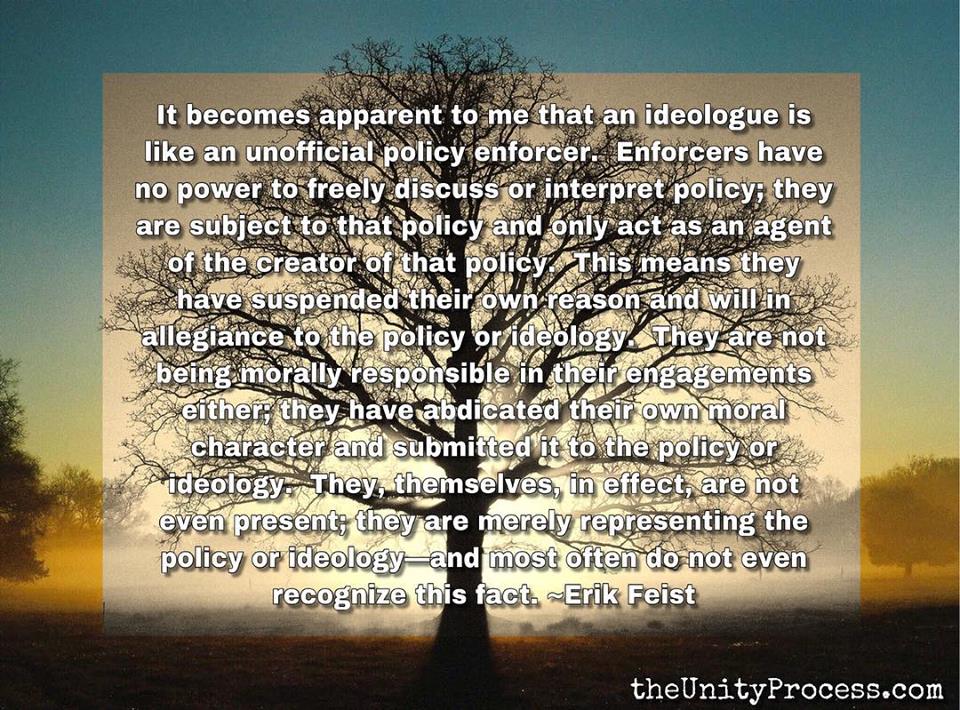 As I’ve mentioned a few times in previous blog posts, the “sin of blasphemy” is essentially elevating one’s subjective preferences and finite understanding to equal status with Divine law, understanding, and will. It is arrogantly mocking God’s universal laws and precepts through placing one’s own finite perceptions, beliefs, preferences, and ideas as if they were equal to or better than what is found in nature’s principles. When such a person is triggered and upset about another person’s lack of adherence to their blasphemous positions, they are being judgmental, which is an emotional and subjectively moral judgment rather than one based upon reason and objectively moral principles.
As I’ve mentioned a few times in previous blog posts, the “sin of blasphemy” is essentially elevating one’s subjective preferences and finite understanding to equal status with Divine law, understanding, and will. It is arrogantly mocking God’s universal laws and precepts through placing one’s own finite perceptions, beliefs, preferences, and ideas as if they were equal to or better than what is found in nature’s principles. When such a person is triggered and upset about another person’s lack of adherence to their blasphemous positions, they are being judgmental, which is an emotional and subjectively moral judgment rather than one based upon reason and objectively moral principles.
Jesus warned about the karmic consequences (action/reaction) of placing oneself in a position of judgment over another person through attempting to gain power over them for subjective reasons, when he stated:
“Do not judge, so that you will not be judged. For in the way you judge, you will be judged; and by your standard of measure, it will be measured to you. Why do you look at the speck that is in your brother’s eye, but do not notice the log that is in your own eye?” ~Matthew 7:1-3
*Side note on the above passage: From a karmic perspective, if one withdraws their subjective judgments and projections from off of others, there’s no way for it to be done back to them either, because life is a mirror reflecting back to each of us the truth of who we are. One of the “others” being judged can also be the Self, where one falsely and emotionally judges oneself based upon externalized moral dogmas, and is self-critical in an unfair and judgmental manner, rather than practicing reasonable reflectivity and self-assessment to maintain the integrity of the process, and keeping one pointed towards a goal that is “faithful and true”.
Morality:
“Of or relating to principles of right and wrong in behavior.” ~Meriam-Webster Dictionary
In its truest sense, morality is intended to be a system of objectively identifiable and universal constants that safeguard our natural rights, and keep us from the theft of our property; all morality is about theft, for instance:
- Theft = theft of one’s various forms of property, such as private, personal, and real.
- Murder = the willful theft of one’s life and right to live it.
- Manslaughter = the unwillful theft of one’s life and right to live it.
- Slander/Libel = theft of one’s reputation and good name.
- Slavery = theft of one’s bodily autonomy, labor, and natural rights.
- Rape = theft of one’s innocence, bodily autonomy, and right to decide one’s own sexual partners.
- Lying/fraud = theft of the truth from another through willful misrepresentation.
Unfortunately, morality can also be entangled with a layer of socially acceptable, non-universal subjective agreements as to what right conduct entails in any given society, such as is the case with sexual preferences, work habits, political leanings, religious beliefs, and taxation, therefore what is considered legal and moral is not always objectively moral in nature, but can be rather subjective.
To be judgmental about another is to make a subjectively moral judgment about their character and behavior as if it were an objectively moral judgment about them, which is therefore elevating the subjective preferences, dogmas, policies, statutes, and agreements of men to equal or higher status than the universal principles and laws of the Divine/God (AKA blasphemy). It is to condemn another as objectively immoral and/or criminal for their decision to abstain from a collective’s subjective agreements; essentially it is a victimless crime, for where they think they see an objective victim, no actual victim exists.
Those who judge others using subjectively moral criteria are viewing an offender’s lack of conformity to their own particular flavor of subjective values as a personal affront and violation of their perception of the Divine/God. To them it is angering (powerless) and chaotic to see a lack of conformity to their moral value system because they see it as a personal attack against their own identity—who they are as a person is under attack by another’s lack of conformity to their flavor of values, and this stems from giving too many fucks about what others think, feel, or do, which stems from unresolved childhood beliefs and traumas which makes many of the things they experience feel personal when they are in fact not personal.
They are projecting their own childhood hangups, beliefs, and traumas, which is essentially their unresolved shadow sides, onto others with righteous indignation and the intent to punish them for their wrong think and behaviors. They are scapegoating the subjects of their anger as a means of controlling the chaos they feel within themselves when they look outside at the lack of conformity, allowing them to escape their personal responsibility to own their own thoughts, feelings, behaviors, and outcomes by attempting to shame, guilt, and even coerce the external world into conformity with their ideology. I know this is all over simplified, and for good reason, entire book collections could be written on the multifaceted dynamics of the causal factors that shape a person’s worldview and psyche, including biological, genetic, familial, societal, and more; as well as how that relates to interpersonal relationships in the microcosm, and also the greater macrocosm of society.
Additionally, the lack of an internal monarch within an individual is a chaotic void that always leads to external monarchs jockeying for position to rule over and control them; sadly, those who serve external monarchs of any flavor and disposition typically become policy enforcers policing the particular dogmas of their chosen flavor of external kings. In such people, the character and personality within their psyche is chaotic and fragmented without form, in a childlike state needing a mother and father to dictate external order over their lives, which makes them feel safer; their internal anarchy (without rulers) makes them susceptible to all forms of external ideologies and religious dogmas from people more than willing to impose their brand of order from without. In exchange for the perceived safety that external rulers bring to them, ideologues forfeit their individual rights and autonomy in service to their particular flavor of external order, and therefore become policy enforcers, like Agent Smith in the Matrix trilogy, in service to their master’s agendas. Ideologues are only able to remain a somewhat free individual to the extent that they are able to serve their masters well, otherwise they too will lose their status, individuality, and privileges to judgmental people playing God over them.
This all reminds me of what my friend Erik Feist said about ideologues back in 2018 or so:

It becomes apparent to me that an ideologue is like an unofficial policy enforcer. Enforcers have no power to freely discuss or interpret policy; they are subject to that policy and only act as an agent of the creator of that policy. This means they have suspended their own reason and will in allegiance to the policy or ideology. They are not being morally responsible in their engagements either, they have abdicated their own moral character and submitted it to the policy or ideology. They, themselves, in effect, are not even present; they are merely representing the policy or ideology–and most often do not even recognize this fact. ~Erik Feist
If one has committed an objectively immoral act, especially in cases where it is with willful intent to steal any form of property from another, whether it is the right to life or some other form of property theft, examining the evidence and formulating moral judgment is perfectly acceptable, and in fact, it is our responsibility to seek out justice for those who have been wronged by holding the perpetrator accountable and responsible for their act(s) of aggression through whatever court systems and/or laws of the land that are pre-established for dealing with objectively criminal activity. However, if we find ourselves emotionally triggered by those who are not adhering to our cultural and societal norms of conduct that might be based upon man-made agreements that have no bearing on objective reality and universal principles, we need to learn how to “stay in our lane” and respect the rights of others via the non-aggression principle, and let them freely live their lives as they see fit. Rather than being irresponsible with our upsets and negative emotions and projecting them onto others who don’t share our same perceptions of reality, and judging them harshly for it, we need to become more responsible and own our upsets and negative emotions, and process their root causes, typically found in our formative childhood experiences, familial beliefs, and societal beliefs, and deconstruct/reconstruct them in a healthier psychological manner.
Like God, we all have the impulse to create order out of the chaos and to make sense of things, but projecting our subjective whims and unresolved shadows onto others in a judgmental fashion isn’t the healthiest way to accomplish this impulse. Rather, those who exercise humility and empathy as a means of reflectively working through their formative childhood experiences will depersonalize the subjective behaviors of others in relationship to themselves, therefore making them feel more powerful and centered in themselves. It’ll cause them to experience true free will and autonomy by solidifying the King within (internal order rather than internal chaos), and make the world a little bit healthier place by withdrawing their shadow projections and no longer enforcing man-made policies, and refocusing to worry more about themselves and their happiness distinct from their collective society and culture from whence they came.
If you imagine someone who is brave enough to withdraw all his projections, then you get an individual who is conscious of a pretty thick shadow. Such a man has saddled himself with new problems and conflicts. He has become a serious problem to himself, as he is now unable to say that they do this or that, they are wrong, and they must be fought against… Such a man knows that whatever is wrong in the world is in himself, and if he only learns to deal with his own shadow he has done something real for the world. He has succeeded in shouldering at least an infinitesimal part of the gigantic, unsolved social problems of our day.
~Carl Jung, “Psychology and Religion” (1938). In CW 11: Psychology and Religion: West and East. P.140
THE UNITY PROCESS: I’ve created an integrative methodology called the Unity Process, which combines the philosophy of Natural Law, the Trivium Method, Socratic Questioning, Jungian shadow work, and Meridian Tapping—into an easy to use system that allows people to process their emotional upsets, work through trauma, correct poor thinking, discover meaning, set healthy boundaries, refine their viewpoints, and to achieve a positive focus. You can give it a try by contacting me for a private session.
Did you enjoy the article? Show your appreciation and buy me a coffee:
Bitcoin: bc1q0dr3t3qxs70zl0y5ccz7zesdepek3hs8mq9q76
Doge: DBLkU7R4fd9VsMKimi7X8EtMnDJPUdnWrZ
XRP: r4pwVyTu2UwpcM7ZXavt98AgFXRLre52aj
MATIC: 0xEf62e7C4Eaf72504de70f28CDf43D1b382c8263F
